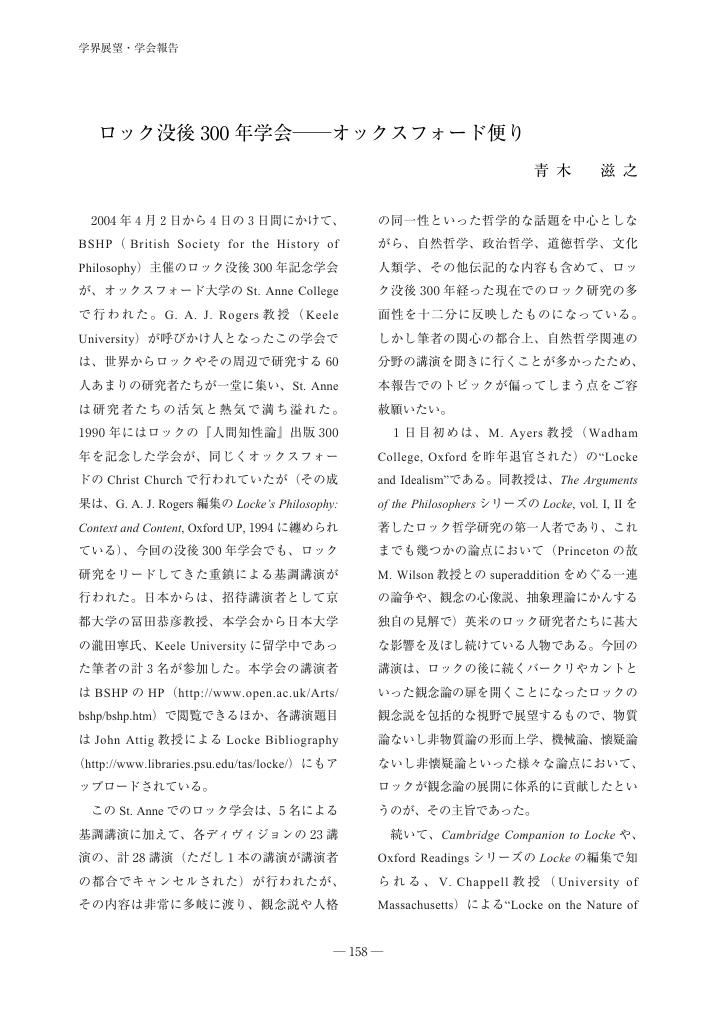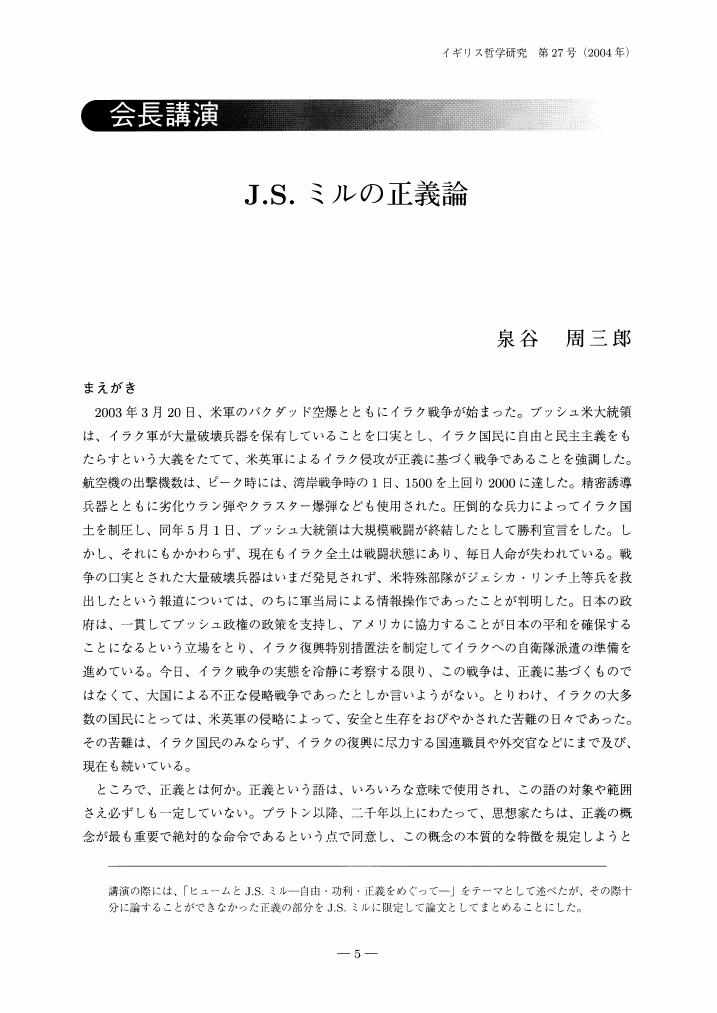1 0 0 0 OA ジョン・オースティンの功利主義論とJ・S・ミル
- 著者
- 川名 雄一郎
- 出版者
- 日本イギリス哲学会
- 雑誌
- イギリス哲学研究 (ISSN:03877450)
- 巻号頁・発行日
- vol.29, pp.103-118, 2006-03-20 (Released:2018-03-30)
- 参考文献数
- 35
This essay discusses John Stuart Mill and John Austin on the utilitarian doctrine in the 1830s. In spite of his disenchantment with Jeremy Bentham, Mill remained to be a utilitarian after the so-called Mental Crisis (1826-7). I first explain why and how Mill advocated the utilitarian doctrine, rejecting the alternatives. Second, the presumable source of his ‘new’ utilitarian theory, i.e. the argument of Austin, is examined, pointing out in what ways Mill's argument had similarities to that of Austin. It is from Austin that Mill learnt a mode in which the utilitarian principle could be coupled with reliance on moral rules.
1 0 0 0 OA 近世スコットランド史の研究動向 ─16・17世紀の思想史を中心に─
- 著者
- 小林 麻衣子
- 出版者
- 日本イギリス哲学会
- 雑誌
- イギリス哲学研究 (ISSN:03877450)
- 巻号頁・発行日
- vol.29, pp.119-125, 2006-03-20 (Released:2018-03-30)
1 0 0 0 OA 第1回イギリス理想主義研究会報告
- 著者
- 行安 茂
- 出版者
- 日本イギリス哲学会
- 雑誌
- イギリス哲学研究 (ISSN:03877450)
- 巻号頁・発行日
- vol.28, pp.147-150, 2005-03-20 (Released:2018-03-30)
1 0 0 0 OA 第31回ヒューム学会年次大会(東京)への道
- 著者
- 坂本 達哉
- 出版者
- 日本イギリス哲学会
- 雑誌
- イギリス哲学研究 (ISSN:03877450)
- 巻号頁・発行日
- vol.28, pp.151-157, 2005-03-20 (Released:2018-03-30)
1 0 0 0 OA ロック没後300年学会―オックスフォード便り
- 著者
- 青木 滋之
- 出版者
- 日本イギリス哲学会
- 雑誌
- イギリス哲学研究 (ISSN:03877450)
- 巻号頁・発行日
- vol.28, pp.158-160, 2005-03-20 (Released:2018-03-30)
1 0 0 0 OA 啓蒙、共和主義、経済学 ―偶然を超えて―
- 著者
- 田中 秀夫
- 出版者
- 日本イギリス哲学会
- 雑誌
- イギリス哲学研究 (ISSN:03877450)
- 巻号頁・発行日
- vol.29, pp.5-18, 2006-03-20 (Released:2018-03-30)
1 0 0 0 OA なぜエモーティヴな意味は非認知的とされるか ─道徳感情説の擁護─
- 著者
- 神野 慧一郎
- 出版者
- 日本イギリス哲学会
- 雑誌
- イギリス哲学研究 (ISSN:03877450)
- 巻号頁・発行日
- vol.29, pp.19-34, 2006-03-20 (Released:2018-03-30)
- 参考文献数
- 22
According to moral sentiment theory, morals cannot be derived from reason. Therefore, if we accept moral sentiment theory, and yet still contend that moral judgments can be cognitive and rational, we have to carry out two tasks. In the first place, we should show that moral judgments based on passions, sentiments, or on something of that kind, can be, as a matter of fact, cognitive, and so have some kind of rationality. Secondly, as many contemporary philosophers still tend to think that emotive meaning is non-cognitive, and so non-rational, we should explain why and how this unfortunate situation has been brought about. In this essay, the author tries to answer the second problem, leaving the first for another occasion. The argument will proceed as follows. The author propounds (1) the process how in the 20th century, many moral philosophers have come to think that moral judgments have no descriptive meaning. And they think that judgments which lack descriptive meaning, cannot be cognitive. The author also attempts to explain (2) how ‘emotion’, during the course of history in the 19th century, has replaced ‘passion’, ‘affection’, ‘sentiment’, etc. These latter feelings, however, not only in moral sentiment theories in the 18th century but also in Aristotle's and Thomas Aquinas' theory, had been considered to be susceptive to reason, and therefore to have some rationality. As for (1), the author depicts the development of ethical theory since G.E. Moore's refutation of ethical naturalism to Stevenson's emotivism. And as for (2), the role William James had played will be emphasized.
1 0 0 0 OA 制作と二つの自然 ―ホッブズの『物体論』に関する一考察―
- 著者
- 川添 美央子
- 出版者
- 日本イギリス哲学会
- 雑誌
- イギリス哲学研究 (ISSN:03877450)
- 巻号頁・発行日
- vol.29, pp.35-48, 2006-03-20 (Released:2018-03-30)
Hobbes regarded the social order as artificial. Though most critics have argued his materialism excludes human productive capacities, this paper tries to show that his notion of nature encompasses metaphysical and epistemological preconditions that enable the mankind to be creative. In his mechanistic conception of philosophy can be found two types of nature: one as the physical world, which consists of matters in motion, and the other as the model science, which is most exemplified in geometry. The former influences our perception of the external world, whereas the latter makes the men capable of forming the civil order. Thus the act of making a commonwealth is made possible and conditioned by the two types of nature.
1 0 0 0 OA ロックのデカルト批判 ―実体の本質をめぐって―
- 著者
- 青木 滋之
- 出版者
- 日本イギリス哲学会
- 雑誌
- イギリス哲学研究 (ISSN:03877450)
- 巻号頁・発行日
- vol.29, pp.49-68, 2006-03-20 (Released:2018-03-30)
- 参考文献数
- 26
It is well known among Locke scholars that Locke owed much to Descartes for the development of his thought. However, the nature of the influence has not been specifically explored. This paper argues that though Locke inherited several philosophical terminologies and a sort of dualist thinking from Descartes, he altered them to serve for his philosophical project: the examination of our ideas and knowledge by means of his “historical, plain method.” A case study of our idea of substance and its essence shows that unlike Descartes Locke stayed agnostic about the very essence of body and mind. Thus it can be said that Locke held a property dualism in contrast to Descartes' substance dualism.
1 0 0 0 OA 意識流の存在論的位置づけ ―W・ジェイ厶ズの前期思想を中心に―
- 著者
- 冲永 宜司
- 出版者
- 日本イギリス哲学会
- 雑誌
- イギリス哲学研究 (ISSN:03877450)
- 巻号頁・発行日
- vol.27, pp.55-69, 2004-03-20 (Released:2018-04-25)
William James's concept “stream of thought” has mainly two backgrounds to build up its original style. The first is the difference between material state and inner state of vital phenomena, and the second is the impossibility to associate plural ideas without transcendental subject. The first is influenced by an issue in the theory of evolution. That is a question, on which point in evolution the inner state of life has emerged. This is the principal impossibility which is contrary to the emergence of vital phenomena as material body. For this problem James reexamines “mind-stuff theory”, and he approves its one aspect which assumes inner state from the beginning of evolution, but rejects its another aspect which affirms association. The problem of the latter aspect has something to do with the second background. To overcome this problem, James attained to “stream” after examining “several another hypotheses”.
1 0 0 0 OA 倫理学(1)倫理思想史
- 著者
- 柘植 尚則
- 出版者
- 日本イギリス哲学会
- 雑誌
- イギリス哲学研究 (ISSN:03877450)
- 巻号頁・発行日
- vol.27, pp.70-73, 2004-03-20 (Released:2018-04-25)
1 0 0 0 OA 因果性批判と懐疑論
- 著者
- 山本 建郎
- 出版者
- 日本イギリス哲学会
- 雑誌
- イギリス哲学研究 (ISSN:03877450)
- 巻号頁・発行日
- vol.28, pp.5-17, 2005-03-20 (Released:2018-03-30)
1 0 0 0 OA ジョン・ロックの経済認識 ―トレードと公共善について―
- 著者
- 門 亜樹子
- 出版者
- 日本イギリス哲学会
- 雑誌
- イギリス哲学研究 (ISSN:03877450)
- 巻号頁・発行日
- vol.28, pp.33-45, 2005-03-20 (Released:2018-03-30)
- 参考文献数
- 29
For Locke, the problems of economy were closely related with the government. He thought that the economic prosperity of England was realized by ‘ordering’ trade. Trade consisted of two fields; one was manufacture, and the other navigation and commerce. And what rotated ‘the wheel’ of trade was money. It was required that landholder, broker (merchant and moneyed-man), and labor took their own part as a component in the circulation of trade. He did not intend to defend their particular interests, but thought about totally the problem of trade in terms of pursuing the public good.
1 0 0 0 OA 正義と効用 ―スミスとヒュームの正義論の検討―
- 著者
- 島内 明文
- 出版者
- 日本イギリス哲学会
- 雑誌
- イギリス哲学研究 (ISSN:03877450)
- 巻号頁・発行日
- vol.28, pp.47-62, 2005-03-20 (Released:2018-03-30)
Both utility and sympathy are the key concepts in Hume's and Smith's theory of justice. Whereas Hume and Smith hold the same view that the rules of justice have utility, their accounts differ in terms of the role of utility and sympathy. In this paper, after the careful analysis of Hume's and Smith's arguments, I would like to propose the following interpretation. Hume explains the evolution of the rules of justice and justifies them based on utility; so sympathy only plays a secondary role in explaining the moral approbation of justice as a virtue. But in Smith's theory it is sympathy that is used to explain the evolution and the enforcement of the rules of justice, and utility plays a part in justification of some kind of punishment and evaluation of laws and social policies.
1 0 0 0 OA ロックとボイルの比較 ―ロックの道徳論の背景として―
- 著者
- 三原 就平
- 出版者
- 日本イギリス哲学会
- 雑誌
- イギリス哲学研究 (ISSN:03877450)
- 巻号頁・発行日
- vol.28, pp.63-78, 2005-03-20 (Released:2018-03-30)
- 参考文献数
- 23
This paper reassesses Locke's theory of ideas with that of Boyle for a background, and argues as follows. Initially, ‘cosmical quality’ is essential for Boyle's corpuscular philosophy, since it manifests radical interactions in the world. Secondly, Locke's theory of qualities in which ideas take a leading part conceals this insight, yet he accepts it. Thirdly, Boyle treats ideas as the principle of the metaphysical and mathematical reasoning in his book about limits of reason. Finally, ideas in Locke are not the principle of the history of matter of fact in the world, and Locke consciously treats these ideas as the principle of the morality.
1 0 0 0 OA ロックの物そのもの ―ヨルトン説の批判的検討―
- 著者
- 青木 滋之
- 出版者
- 日本イギリス哲学会
- 雑誌
- イギリス哲学研究 (ISSN:03877450)
- 巻号頁・発行日
- vol.26, pp.21-38, 2003-03-20 (Released:2018-04-25)
- 参考文献数
- 18
It has been debated whether Locke holds direct realism or representative theory of perception. This paper examines the key concept, things themselves, to help determine that Locke is really a supporter of representative theory of perception. Yolton's view of things themselves — its emphasis on natural history of the day — is criticized for not adequately dealing with another decisive feature of things themselves — the corpuscular structure of the body. With this latter concept considered, Locke's idea should be seen as immediate object of mind, indicating that things themselves cannot be perceived in a direct way.
1 0 0 0 OA アダム・ファーガスンの道徳哲学の方法と、スコットランド哲学の伝統
- 著者
- 福田 名津子
- 出版者
- 日本イギリス哲学会
- 雑誌
- イギリス哲学研究 (ISSN:03877450)
- 巻号頁・発行日
- vol.26, pp.39-52, 2003-03-20 (Released:2018-04-25)
This paper intends to show that Adam Ferguson's moral philosophy has a body of theory, and that it follows the tradition of Scottish Philosophy. The tradition has 3 characteristics: 1. method of observation, 2. introspection, 3. a priori principles. Ferguson insists on the natural historian's method to find the ultimate facts, which are the superior facts that every theory must depend on. As for the moral approbation, he explains it by the law of estimation — the ultimate fact. The law can also be the guiding principle of man's good actions, since this moral approbation is accompanied with simple emotions of admiration or contempt.
1 0 0 0 OA 行為の理由の内的解釈について ―ウィリアムズの議論を中心に―
- 著者
- 鶴田 尚美
- 出版者
- 日本イギリス哲学会
- 雑誌
- イギリス哲学研究 (ISSN:03877450)
- 巻号頁・発行日
- vol.26, pp.73-86, 2003-03-20 (Released:2018-04-25)
- 参考文献数
- 15
In this paper, I will focus on Bernard Williams' discussion on reasons for action. He takes a position called ‘internalism’, and claims that a statement ‘A has a reason to φ' is true if and only if there is a sound deliberative route from A's subjective motivational set to A's φ-ing. I will examine the necessary connection between this ‘internal reason statement’ and an agent's motivational state, and show why internal reasons have normative force. Then, I will suggest that statements which Williams calls ‘external reason statement’ can be well interpreted if we take them as a kind of advice or recommendation.
1 0 0 0 OA 美学
- 著者
- 浜下 昌宏
- 出版者
- 日本イギリス哲学会
- 雑誌
- イギリス哲学研究 (ISSN:03877450)
- 巻号頁・発行日
- vol.26, pp.87-91, 2003-03-20 (Released:2018-04-25)
1 0 0 0 OA J.S.ミルの正義論
- 著者
- 泉谷 周三郎
- 出版者
- 日本イギリス哲学会
- 雑誌
- イギリス哲学研究 (ISSN:03877450)
- 巻号頁・発行日
- vol.27, pp.5-20, 2004-03-20 (Released:2018-04-25)








